Beta-alanine
Beta-alanine has become a very popular supplement. This is not surprising, since several studies show that it is a very effective and useful pre-workout supplement/ingredient. This supplement is also well known for its ability to give users a tingling sensation. This short tingling sensation is safe and is not noticeable anymore after using this supplement for a longer period. Nonetheless, the tingling sensation may surprise users which try a pre-workout product containing beta-alanine for the first time. Nowadays, many pre-workout supplements contain beta-alanine due to the benefits. However, many pre-workout products contain a lower amount of beta-alanine than recommended by research. Therefore, it is often recommended to increase the daily intake of beta-alanine if you want to optimally improve athletic performance, even if you are using a pre-workout supplement.
Beta-Alanine is also known as:
β-Alanine
3-Aminopropionic acid
CarnoSyn (brand name)

Functions of Beta-Alanine
Unfortunately, due to European legislation, we cannot describe all the effects and functions of this product. Not even if these have been confirmed by research. Nevertheless, we do our best to provide you with as much relevant information as possible.
Beta-alanine is a very popular pre-workout ingredient. This is not surprising given the potential effectiveness of this supplement [1][2][9][10][11][30][33]. It is not only used by people who participate in strength training, but also by people who participate in endurance training.
Who can use beta-alanine ?
This amino acid is very suitable for people who are looking for an effective pre-workout. Due to its beneficial effects, this supplement is not only suitable for people who do strength training. After all, research has shown that this supplement can also be beneficial for people who participate in other sports, such as: running, cycling, wrestling and more [3][4][5][6][7].
How should I use beta-alanine ? / Dosages
Current research states that ~3-6g beta-alanine per day is an appropriate amount as a pre-workout. Unfortunately, current research regarding the optimal time of consumption is not completely clear. However, it seems that the time of consumption isn’t nearly as important as the consistent daily consumption of beta-alanine [13]. Due to this, it does not matter as much at what time it is consumed. However, some people suggest that it should be consumed prior to exercise in order to get the most beneficial effects. This suggestion is made, since this gives users the ability to also benefit from the shorter term effects of beta-alanine during exercise.
Dosages can also be taken throughout the day. This can reduce the tingling sensation (paresthesia) that may accompany beta-alanine consumption. This tingling sensation is safe, and our body will build up a tolerance to it. However, some people prefer to spread dosages throughout the day to avoid this tingling effect.
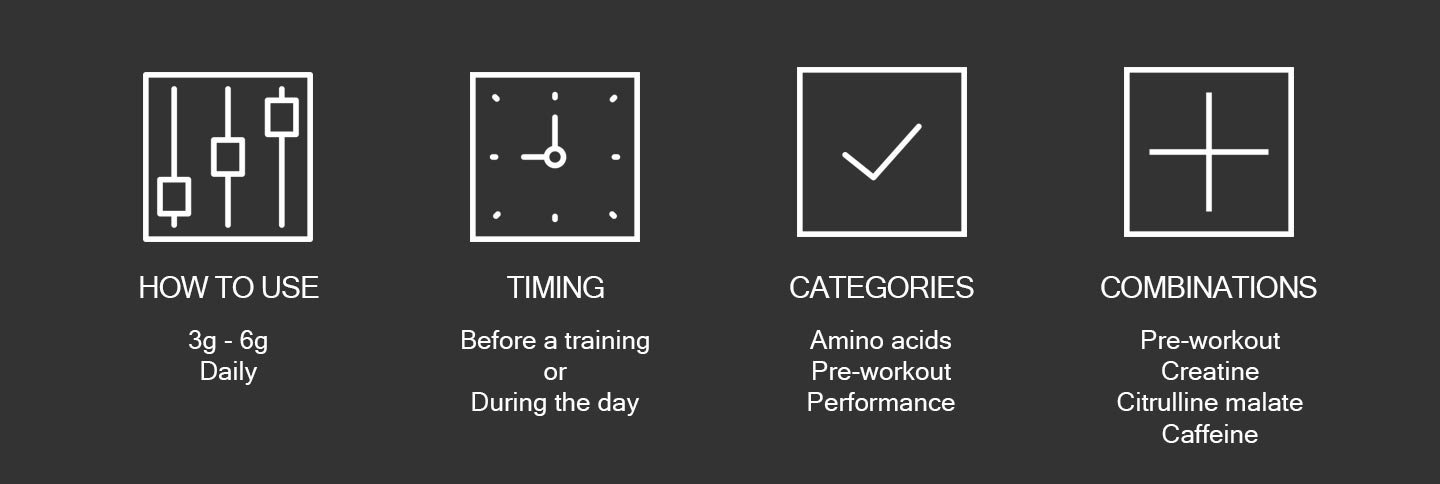
Stacking / combining
Beta-alanine can be perfectly combined with various other supplements. Due to the many possible combinations, it is also commonly found in pre-workout supplements. However, many people use extra beta-alanine to maximize the beneficial effects of this amino acid. This is often done because of the limited amount of beta-alanine in most pre-workout supplements.
Research has also shown that beta-alanine can be combined well with creatine. This combination is recommended because together they may function well as a pre-workout. In addition, some people recommend combining this amino acid with a taurine supplement. This is suggested because high concentrations of beta-alanine could lower taurine levels [25]. However, normal doses of beta-alanine have been shown to be too low to decrease taurine levels in our body [17][19]. Therefore, this combination is not necessary when normal doses are used.
Where does beta-alanine come from ?
Beta-alanine is a naturally occurring beta-amino acid. Our body can produce it in small amounts, and it can also be found in small amounts in our food. The best food sources of beta-alanine are: meat, poultry and fish. Due to these sources, vegetarians and vegans have ~50% less carnosine in their muscles compared to omnivores [26]. This makes a beta-alanine supplement even more important for vegetarians and vegans.

Other information
Carnosine supplement vs beta-alanine supplement
At first glance, it may seem beneficial to use a carnosine supplement instead of beta-alanine. However, pure carnosine is largely broken down before it can even reach our muscles [27].
L-Alanine supplement vs beta-alanine supplement
While their name is very similar, they are not substitutes for each other. L-alanine is a nonessential amino-acid which is used in protein synthesis. Beta-alanine is not used in protein synthesis and is mainly used as a pre-workout supplement.
Paraesthesia (tingling feeling)
Consuming beta-alanine may cause a short harmless tingling sensation on the skin [13]. This tingling sensation is known as paresthesia, and there are no harmful effects associated with it [13]. It is usually experienced in the neck, face, and the back of the hands. However, not everybody experiences this effect, since the paresthesia threshold varies from person to person. Furthermore, people seem to build a tolerance to the paresthesia over time. Due to this, the tingling feeling should reduce on its own over time.
Most people don’t mind the tingling sensation, and there are also people who like it. Fortunately, there are ways to avoid it for people that don’t like it. The best way to avoid it, is to use smaller dosages more times throughout the day. For example: 4 dosages of 1 gram per day, instead of 1 dosage of 4 gram per day.
Daily use
Beta-alanine is commonly found in pre-workout supplements. However, the amount of beta-alanine in standard pre-workout supplements is often too low for optimal effects. For optimal effects, this amino acid should also be used daily. Due to these factors, it often concluded that a separate beta-alanine supplement is useful to obtain the maximum benefits.
Daily use is very important. However, we would like to emphasize that it is not a problem if consumption is occasionally forgotten. If not consumed for one day, the carnosine level in our muscles may drop slightly. However, this small drop will not be noticeable to most people.
Safety & competitive use
Safety
Different studies have shown that beta-alanine supplements are safe [13][30][31][32]. The only side-effect is the short and harmless tingling sensation on the skin, as described earlier [13]. The safety of this supplement should not be surprising, since beta-alanine can be created by our own body, and be excreted without problems [30].
Competitive use
Due to the benefits, this supplement is used by many professional athletes. The use of this supplement is allowed, and will not result in problems for professional athletes.
Correct use
A dietary supplement can contribute to a healthy and active lifestyle. However, it should not be a substitute for a healthy lifestyle and a varied diet. The recommended dosage should not be exceeded, since side effects may occur otherwise. Temporary side effects of beta-alanine can include a tingling sensation.
As with any supplement, we advise users to consult a physician before use. In particular if you use medication or have health complaints. This product should not be used by women who are pregnant or breastfeeding. Furthermore, this product should not be used by persons under 18 years of age and must be kept out of the reach of children. Keep this product in a cool and dry place to maintain the quality.
References
- Hobson, R. M., Saunders, B., Ball, G., Harris, R. C., & Sale, C. (2012). Effects of β-alanine supplementation on exercise performance: a meta-analysis. Amino acids, 43(1), 25-37.
- Saunders, B., Elliott-Sale, K., Artioli, G. G., Swinton, P. A., Dolan, E., Roschel, H., … & Gualano, B. (2017). β-alanine supplementation to improve exercise capacity and performance: a systematic review and meta-analysis. British Journal of Sports Medicine, 51(8), 658-669.
- Ducker, K. J., Dawson, B., & Wallman, K. E. (2013). Effect of beta-alanine supplementation on 800-m running performance. International journal of sport nutrition and exercise metabolism, 23(6), 554-561.
- Howe, S. T., Bellinger, P. M., Driller, M. W., Shing, C. M., & Fell, J. W. (2013). The effect of beta-alanine supplementation on isokinetic force and cycling performance in highly trained cyclists. International journal of sport nutrition and exercise metabolism, 23(6), 562-570.
- Glenn, J. M., Gray, M., Stewart Jr, R. W., Moyen, N. E., Kavouras, S. A., DiBrezzo, R., … & Stone, M. S. (2016). Effects of 28-day beta-alanine supplementation on isokinetic exercise performance and body composition in female masters athletes. The Journal of Strength & Conditioning Research, 30(1), 200-207.
- Gross, M., Boesch, C., Bolliger, C. S., Norman, B., Gustafsson, T., Hoppeler, H., & Vogt, M. (2014). Effects of beta-alanine supplementation and interval training on physiological determinants of severe exercise performance. European journal of applied physiology, 114(2), 221-234.
- Kern, B. D., & Robinson, T. L. (2011). Effects of β-alanine supplementation on performance and body composition in collegiate wrestlers and football players. The Journal of Strength & Conditioning Research, 25(7), 1804-1815.
- Hobson, R. M., Harris, R. C., Martin, D., Smith, P., Macklin, B., Gualano, B., & Sale, C. (2013). Effect of beta-alanine with and without sodium bicarbonate on 2,000-m rowing performance. International journal of sport nutrition and exercise metabolism, 23(5), 480-487.
- Smith, A. E., Walter, A. A., Graef, J. L., Kendall, K. L., Moon, J. R., Lockwood, C. M., … & Stout, J. R. (2009). Effects of β-alanine supplementation and high-intensity interval training on endurance performance and body composition in men; a double-blind trial. Journal of the International Society of Sports Nutrition, 6(1), 1-9.
- Kresta, J. Y., Oliver, J. M., Jagim, A. R., Fluckey, J., Riechman, S., Kelly, K., … & Kreider, R. B. (2014). Effects of 28 days of beta-alanine and creatine supplementation on muscle carnosine, body composition and exercise performance in recreationally active females. Journal of the International Society of Sports Nutrition, 11(1), 1-15.
- Hoffman, J. R., Landau, G., Stout, J. R., Hoffman, M. W., Shavit, N., Rosen, P., … & Ostfeld, I. (2015). β-Alanine ingestion increases muscle carnosine content and combat specific performance in soldiers. Amino acids, 47(3), 627-636.
- Stout, J. R., Graves, B. S., Smith, A. E., Hartman, M. J., Cramer, J. T., Beck, T. W., & Harris, R. C. (2008). The effect of beta-alanine supplementation on neuromuscular fatigue in elderly (55–92 years): a double-blind randomized study. Journal of the International Society of Sports Nutrition, 5(1), 1-6.
- Stellingwerff, T., Decombaz, J., Harris, R. C., & Boesch, C. (2012). Optimizing human in vivo dosing and delivery of β-alanine supplements for muscle carnosine synthesis. Amino acids, 43(1), 57-65.
- Stegen, S., Blancquaert, L., Everaert, I., Bex, T., Taes, Y., Calders, P., … & Derave, W. (2013). Meal and beta-alanine coingestion enhances muscle carnosine loading. Med Sci Sports Exerc, 45(8), 1478-85.
- Harris, R. C., Tallon, M. J., Dunnett, M., Boobis, L., Coakley, J., Kim, H. J., … & Wise, J. A. (2006). The absorption of orally supplied β-alanine and its effect on muscle carnosine synthesis in human vastus lateralis. Amino acids, 30(3), 279-289.
- Derave, W., Ozdemir, M. S., Harris, R. C., Pottier, A., Reyngoudt, H., Koppo, K., … & Achten, E. (2007). β-Alanine supplementation augments muscle carnosine content and attenuates fatigue during repeated isokinetic contraction bouts in trained sprinters. Journal of applied physiology, 103(5), 1736-1743.
- Hill, C. A., Harris, R. C., Kim, H. J., Harris, B. D., Sale, C., Boobis, L. H., … & Wise, J. A. (2007). Influence of β-alanine supplementation on skeletal muscle carnosine concentrations and high intensity cycling capacity. Amino acids, 32(2), 225-233.
- Sale, C., Saunders, B., & Harris, R. C. (2010). Effect of beta-alanine supplementation on muscle carnosine concentrations and exercise performance. Amino acids, 39(2), 321-333.
- Caruso, J., Charles, J., Unruh, K., Giebel, R., Learmonth, L., & Potter, W. (2012). Ergogenic effects of β-alanine and carnosine: proposed future research to quantify their efficacy. Nutrients, 4(7), 585-601.
- Blancquaert, L., Everaert, I., & Derave, W. (2015). Beta-alanine supplementation, muscle carnosine and exercise performance. Current Opinion in Clinical Nutrition & Metabolic Care, 18(1), 63-70.
- Hoffman, J. R., Zuckerman, A., Ram, O., Sadot, O., Stout, J. R., Ostfeld, I., & Cohen, H. (2017). Behavioral and inflammatory response in animals exposed to a low-pressure blast wave and supplemented with β-alanine. Amino Acids, 49(5), 871-886.
- Culbertson, J. Y., Kreider, R. B., Greenwood, M., & Cooke, M. (2010). Effects of beta-alanine on muscle carnosine and exercise performance: a review of the current literature. Nutrients, 2(1), 75-98.
- Sahlin, E. H. K. (1980). Acid-base balance during exercise. Exercise and sport sciences reviews, 8(1), 41-128.
- Severin, S. E., Kirzon, M. V., & Kaftanova, T. M. (1953). Effect of carnosine and anserine on action of isolated frog muscles. Doklady Akademii Nauk SSSR, 91(3), 691-694.
- Gemelli, T., de Andrade, R. B., Rojas, D. B., Zanatta, Â., Schirmbeck, G. H., Funchal, C., … & Wannmacher, C. M. D. (2018). Chronic exposure to β-alanine generates oxidative stress and alters energy metabolism in cerebral cortex and cerebellum of Wistar rats. Molecular neurobiology, 55(6), 5101-5110.
- Harris, R. C., Jones, G., Hill, C. A., Kendrick, I. P., Boobis, L., Kim, C., … & Wise, J. A. (2007). The carnosine content of V lateralis in vegetarians and omnivores.
- Everaert, I., Stegen, S., Vanheel, B., Taes, Y., & Derave, W. (2013). Effect of beta-alanine and carnosine supplementation on muscle contractility in mice. Medicine and science in sports and exercise, 45(1), 43-51.
- Baguet, A., Reyngoudt, H., Pottier, A., Everaert, I., Callens, S., Achten, E., & Derave, W. (2009). Carnosine loading and washout in human skeletal muscles. Journal of applied physiology, 106(3), 837-842.
- Stellingwerff, T., Anwander, H., Egger, A., Buehler, T., Kreis, R., Decombaz, J., & Boesch, C. (2012). Effect of two β-alanine dosing protocols on muscle carnosine synthesis and washout. Amino acids, 42(6), 2461-2472.
- Trexler, E. T., Smith-Ryan, A. E., Stout, J. R., Hoffman, J. R., Wilborn, C. D., Sale, C., … & Antonio, J. (2015). International society of sports nutrition position stand: Beta-Alanine. Journal of the International Society of Sports Nutrition, 12(1), 1-14.
- Ko, R., Low Dog, T., Gorecki, D. K., Cantilena, L. R., Costello, R. B., Evans, W. J., … & Sarma, N. D. (2014). Evidence-based evaluation of potential benefits and safety of beta-alanine supplementation for military personnel. Nutrition reviews, 72(3), 217-225.
- Dolan, E., Swinton, P. A., Painelli, V. D. S., Stephens Hemingway, B., Mazzolani, B., Infante Smaira, F., … & Gualano, B. (2019). A systematic risk assessment and meta-analysis on the use of oral β-alanine supplementation. Advances in Nutrition, 10(3), 452-463.
- Quesnele, J. J., Laframboise, M. A., Wong, J. J., Kim, P., & Wells, G. D. (2014). The effects of beta-alanine supplementation on performance: a systematic review of the literature. International journal of sport nutrition and exercise metabolism, 24(1), 14-27.
Author

| Weight | 0.250 kg |
|---|---|
| Ingredient | Beta-alanine |
| Serving size | Consume 3-6 leveled scoops (3g-6g) daily. Mix with ~100ml of water or juice, or with a pre-workout shake. The recommended intake moment is 15-60 minutes before a workout, or throughout the day. Several smaller dosages can be used throughout the day to reduce the tingling sensation. |
| Allergens | None |
| Suitable for | Non-vegetarians, vegetarians and vegans |
| Warning | Food supplements shouldn't replace a varied, balanced diet and a healthy lifestyle. This supplement can provide a short and harmless tingling sensation on the skin. Do not exceed the recommended daily intake. Store cool, dry and keep out of reach of children. Do not use during pregnancy or lactating. Always consult a docter before you start using a dietary supplement, especially if you use medication or have health problems. |

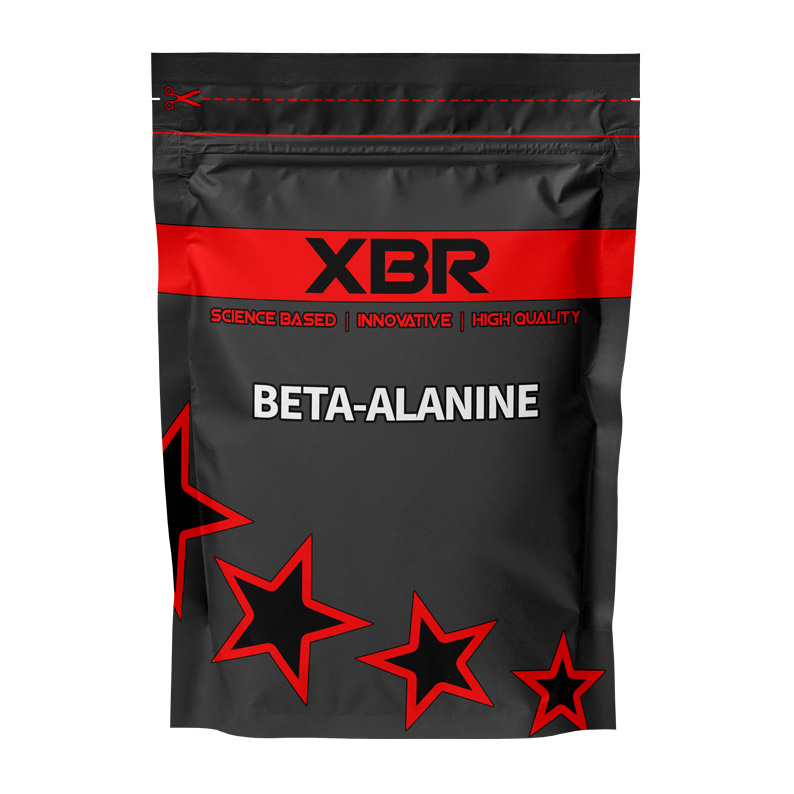
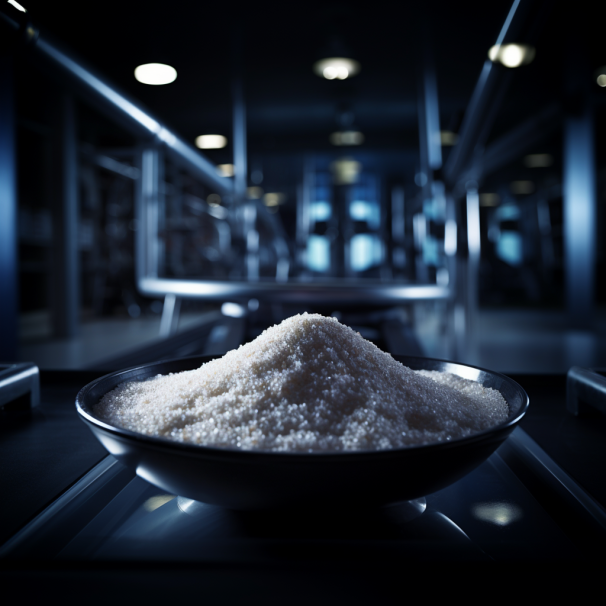


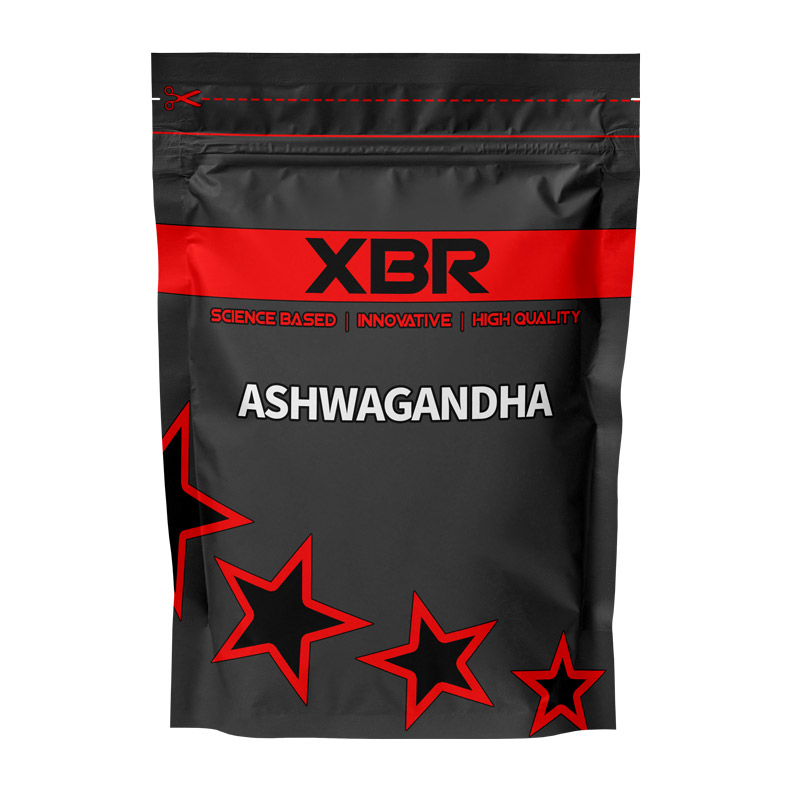
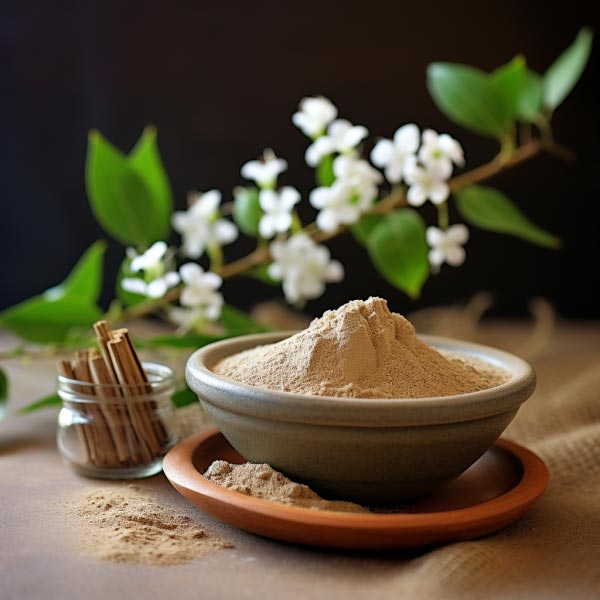

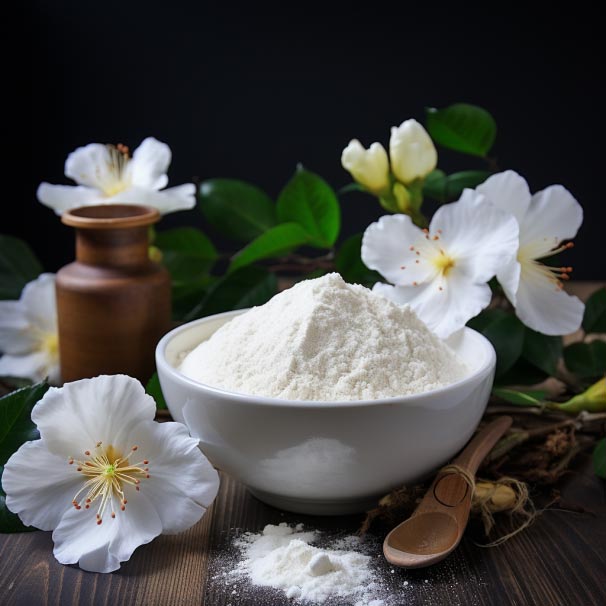

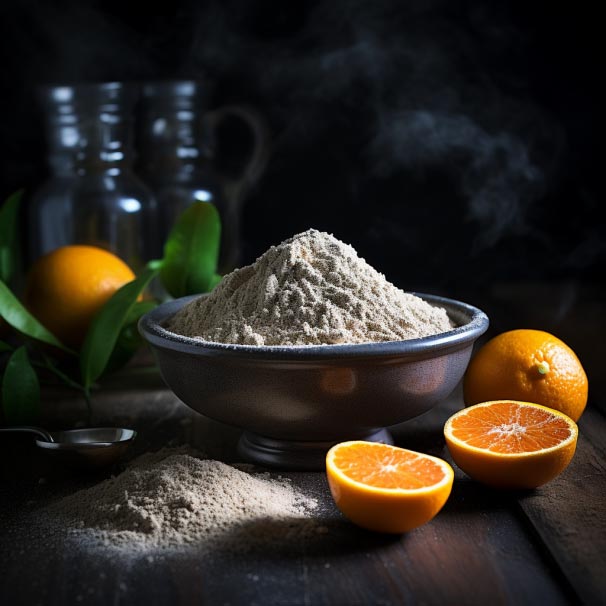

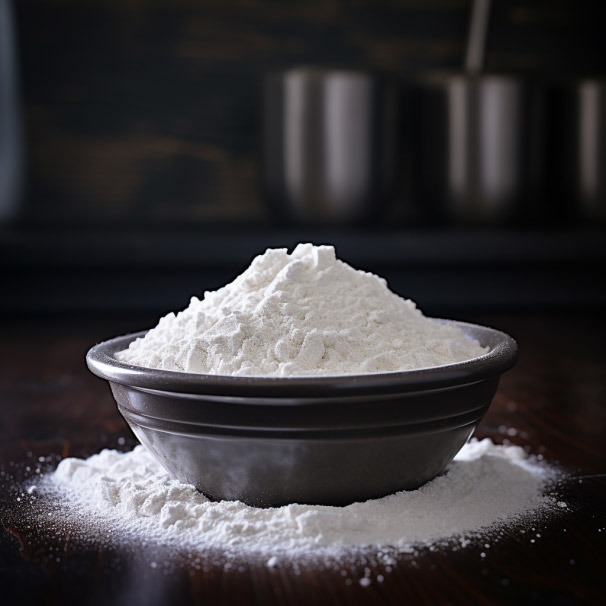
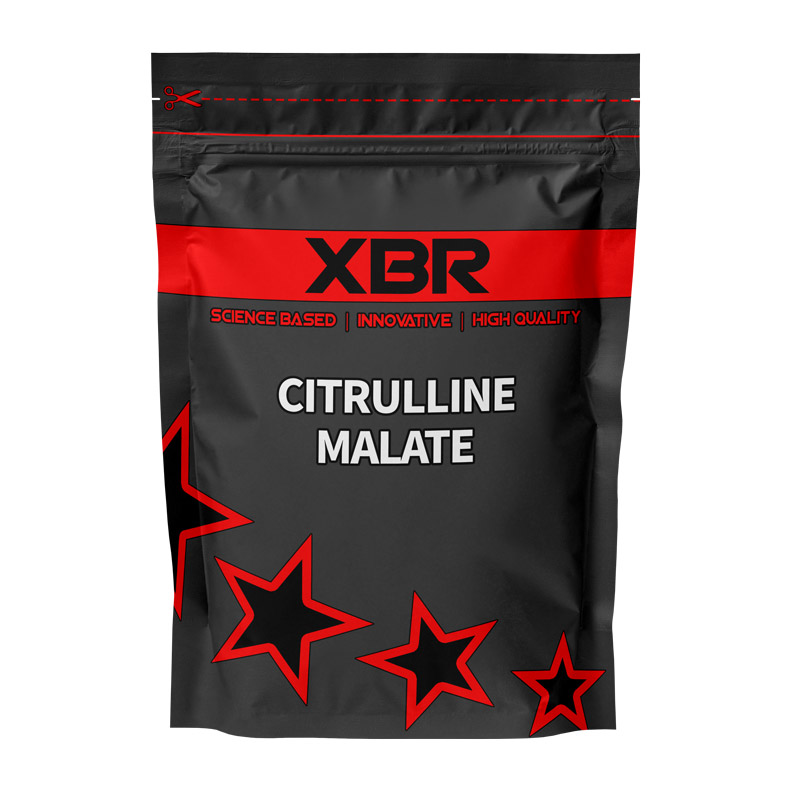
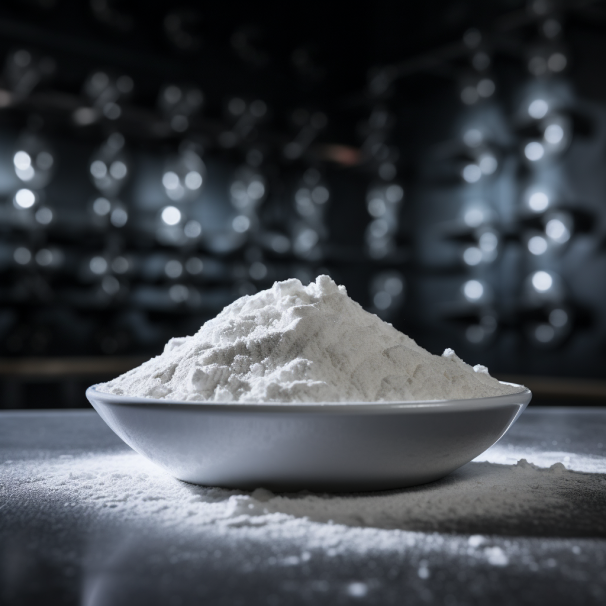


Reviews
There are no reviews yet.